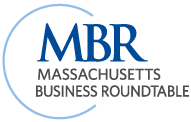Open Forum Roundup: Creating Pathways to College & Career
Increasing opportunity pathways is at the center of the Roundtable’s advocacy for improved education and workforce development public policy and a key priority for the Roundtable during the 2021-22 Legislative Session. As part of this focus, the Roundtable convened an Open Forum to receive an overview from the state leaders behind the Commonwealth’s Early College High School (ECHS) program. ECHS programs are one example for how Massachusetts is and can continue to increase access and opportunities for students today to build a stronger workforce for the future.
This latest Open Forum featured Katherine Craven, an Executive Committee Roundtable member and Chief Administration & Financial Officer at Babson College who also serves as Chair of the Massachusetts Board of Elementary and Secondary Education. The Open Forum also featured guests including Chris Gabrieli, Chair of the Massachusetts Board of Higher Education and CEO of Empower Schools and Kristin Hunt, Director of Early College Programs at the Massachusetts Department of Elementary and Secondary Education. Together, these leaders helped to define Early College for Roundtable members and how this program is leading to positive results with potential for even greater impact. Nationally, the Early College movement is over 20 years old and The Gates Foundation was an early investor in the model. Early College High Schools now exist across the country with the largest efforts existing in North Carolina, New York City, Michigan, and Texas—paving pathways for high school students to gain college credits while attending high school and bridging an opportunity for Early College high school students to pursue higher education.
Why is Early College needed in Massachusetts? There is a significant equity gap in post-secondary success, with Black and Hispanic students obtaining a post-secondary degree at much lower rates than white and non-low-income students. In fact, some estimates find that if Black and Hispanic students graduated at the same rate as white students, it would lead to significant increase in economic activity in Massachusetts. In early 2016, the state Boards of K12 and Higher Education and the Baker Administration started to explore how to grow ECHS programs in Massachusetts especially focused on targeting underserved students. Today, there are 31 designated ECHS programs in the state in partnership with 42 high schools and 22 higher education institutions (including private institutions, state universities, and community colleges). Now, with five years of experience and enrollment growing, early data in Massachusetts demonstrates higher graduation rates among ECHS students; in particular, the number of students who persist in college for more than 2 semesters remains significantly higher among ECHS students.
The impact of the COVID-19 pandemic provides more urgency to scale ECHS programs, and the goal is to build increased awareness and support for ECHS programs to support their growth and increase enrollment. As Chairs Craven and Gabrieli shared, this requires state funding, philanthropy, and an alliance of supporters. The current FY22 budget increased funding for the program, which will cover the direct costs to participating colleges to conduct ECHS programs. Pending legislation would also increase state support for ECHS programs including greater access for students. The Roundtable continues to advocate for expanded access to Early College in partnership with the Massachusetts Business Coalition on Skills and as a founding member of the Massachusetts Business Alliance for Education.
RECENT POSTS
- Quarterly Policy Roundup: Q1 2024
- Black History Month: Reflections from Roundtable Staff
- Roundtable Members Discuss Impact of Business on Society
- Quarterly Policy Roundup: Q3 2023
- What We Heard This Summer in Our Roundtable Member Meetings
- Health Equity in Massachusetts and Why it Matters
- Growing MA’s Labor Market: Why Immigrants Should be Part of the Solution
- Massachusetts’ Future of Energy
- Roundtable Members Share Reflections on Workforce Dynamics
- Quarterly Policy Roundup: Q1 2023
